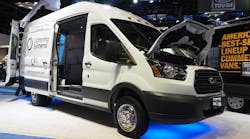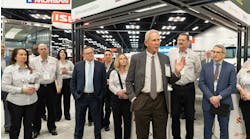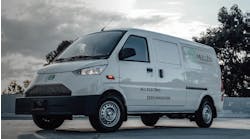Lightning Systems rolls out electric Ford Transit, offers extended range option
INDIANAPOLIS. Lightning Systems announced that it's on track for March deliveries of its new zero-emissions LightningElectric system for Ford Transit vans and that it has developed a zero-emission hydrogen fuel cell range extender for the product.
Announced last September, the LightningElectric battery conversion package is available for Ford Transit as part of Ford Motor Co.'s eQVM program. The first customer deliveries will occur this month as planned, Lightning Systems said.
The company has a converted Transit with the 50-mi. range package on display at the Work Truck Show going on this week in Indianapolis. Lightning said it will host a series of ride-and-drive events in California and New York in April.
Lightning Systems said its new hydrogen fuel cell range-extender electric conversion for the Transit allows for a range of more than 200 miles. The company said the product will be available starting in September in California, where significant vouchers for fuel cell vehicles and infrastructure are available.
Tim Reeser, CEO of Lightning Systems, said the company's on-road validation testing of its electric-converted Transit have proven it is "smooth, quiet, and fast." Both the all-electric and the zero-emissions hydrogen fuel cell range-extended electric conversions are available for heavy-duty Transits with a 10,360-lb. gross vehicle weight rating.
Ford's vehicle warranty covers the base chassis for vehicles with the Lightning conversions, and installations and service can be performed by Ford QVM upfitters and dealers around the world. The all-electric Lightning product features a liquid-cooled Lithium-Ion battery that the company said can be fast-charged in 30 minutes or six hours with Level 2 charging.
Depending on battery option and drive cycle, the LightningElectric Transit has a payload capacity of up to 4,000 lbs. The LightningElectric fuel cell range extender uses hydrogen stored onboard in carbon fiber-wrapped pressure vessels equipped with sensors. The hydrogen is delivered to a fuel cell to charge a Lithium-Ion battery with up to 30 kW of power. The product gives the Transit a range of more than 200 miles and top speed of 75 mph, according to the company.




